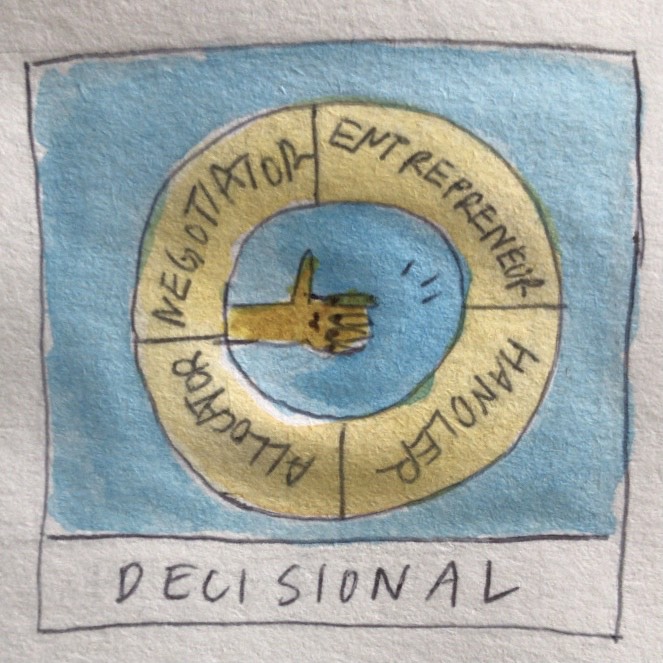A manager isn’t a magician. It’s only through experience and practical knowledge that a manager can become an effective leader. But first, it’s important to recognize the roles and responsibilities of a manager in different organizational structures.
Henry Mintzberg, a Canadian management expert and author, came up with the idea of interweaving practical experience with business theory. In his 1990 book Mintzberg on Management: Inside our Strange World of Organizations, he listed clearly-defined roles for managers to become effective team leaders.

The Mintzberg managerial roles are categorized under three sections—interpersonal, informational, and decisional. These three categories comprise 10 roles of a manager. To be a good leader, you have to manage your teams by leveraging strengths, resolving conflicts, and prioritizing tasks. Harappa Education’s Managing Teamwork course helps you navigate your way around your workplace with proficiency.
Frameworks such as the Social Styles model and the 3Ps template teach you how to accommodate different workstyles and overcome challenges not as individuals, but as a team. Let’s delve into the Henry Mintzberg managerial roles for professional success.
The 10 Roles Of A Manager
Mintzberg managerial roles comprise a variety of responsibilities that are attributed to a manager across divisions. Some of these responsibilities are communication, time management, conflict resolution, and decision-making. Mintzberg studied different types of organizations (a consulting firm, a school, a tech firm, a consumer goods manufacturer, and a hospital) and identified 10 roles of a manager. He divided them into three categories:
- Interpersonal roles relating to a manager’s authority in an organization
- Informational roles involving communicating important information and data
- Decisional roles concerning decision-making, negotiations, and implementation
Understanding Mintzberg’s 10 Managerial Roles
Let’s look at each in greater detail.
Interpersonal Roles:

1. Figurehead
As the Figurehead, a manager is responsible for official and social duties that reflect their status and authority in the organization. It’s about building a strong relationship with peers and subordinates. You can become a good role model by being empathetic and compassionate.
2. Leader
The Leader inspires, encourages, and builds morale. Managers build lasting relationships with team members by monitoring their performance and coaching them when needed. Emotional intelligence can help you develop a trust-based relationship with your team.
3. Liaison
A manager has to exchange information with various departments and teams as well as with external stakeholders. Liaising with other organizations, competitors, and government representatives is equally important for professional development.
Informational Roles:

1. Monitor
The Monitor is responsible for gathering intel for sustained competitive advantage. To do that, a manager has to assess the market for changes and collect relevant data that could impact the organization. These are stages in the process of strategic management that helps an organization to survive the competition.
2. Disseminator
The Disseminator communicates useful and relevant information to team members and subordinates. It’s important to invite feedback, ideas, and views from each employee to keep an open channel of communication.
3. Spokesperson
Convey important information about the organization to external stakeholders. This could be for PR purposes, addressing government policies, or dealing with suppliers. You must have a clear idea of your company’s brand image to become a successful spokesperson.
Decisional Roles:

1. Entrepreneur
Be prepared to take initiative as part of your managerial duties. Initiate projects and address concerns with effective problem-solving skills. Icebreakers and team-building activities will help you connect with your team.
2. Disturbance Handler
The Disturbance Handler ensures that everything runs smoothly. Key responsibilities include resolving conflicts with mentoring sessions, identifying areas for improvement, and addressing gaps in teamwork.
3. Resource Allocator
The Resource Allocator is concerned with fund allocation, cutting costs, and distributing resources across the organization. You have to apportion available resources such as funding, human resources, and materials where needed.
4. Negotiator
A successful negotiation leads to a win-win outcome. A manager has to participate in negotiations with team members and other stakeholders to reach a favorable outcome for both parties. This role distinguishes you from other managers because you have to consider your team’s best interests.
Henry Mintzberg’s managerial roles are useful to assess your strengths and weaknesses as a manager. You can improve your managerial duties with practice and experience.
Strengthen Your Managerial Responsibilities
Once you have identified your roles and responsibilities, it’s time to put those management skills to use. There are several steps you can take to become a good and effective manager while making room for career advancement:
1. Decision-Making
Sound decision-making skills are essential, especially for managers and team leaders. From leading critical meetings to overseeing team responsibilities, being an effective manager means analyzing complex business problems and implementing a sound plan moving forward.
2. Self-Awareness
Healthy self-awareness is what makes you a high-performing individual. It’s because you use emotional intelligence and empathy to navigate your workplace relationships. By assessing yourself, you can gain insight into your strengths and weaknesses and use them to reflect on your interactions with your teams. It even helps you enhance professional development.
3. Build Trust
The core tenet of successful teams is establishing trust and credibility. If you want your employees to be on the same page and function together with minimal conflicts, you need to be able to build trust-rich relationships. The more individuals trust each other, the easier it is to promote teamwork and collaboration.
If you want the best for yourself and your team, Harappa’s Managing Teamwork course features expert faculty who will teach you concepts you can use to manage your team effectively. The Bruce Tuckman Model is one such concept that comprises four stages—Forming, Storming, Norming and Performing. Our expert faculty also share personal experiences to illustrate important frameworks that will help you become the best leader in your organization.
Explore topics such as Strategic Management, Strategic Management Process & MBWA from our Harappa Diaries section and manage teams effectively.
 now, no signup required!
now, no signup required!




